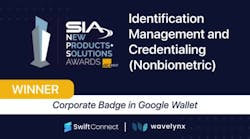Munich, Germany-based Infineon Technologies AG has received a multi-million piece purchase order from the United States government to supply security chips for new electronic passports.
The U.S. began issuing electronic passports to diplomats and other government workers in late 2005, and is now expanding the program to include tourist passports used by private citizens. By the end of the year, the government expects that all new U.S. passports will be issued as electronic passports.
The company did not provide information on the value of the deal. Infineon projected, however, that up to 15 million of the new passports will be issued in the first year of the program, and that the government has issued more than 67 million passports in the past 10 years.
Earlier this year, Infineon spun-off its successful memory division http://www.reed-electronics.com/electronicnews/article/CA6320854 into Qimonda, which made its debut on the NYSE http://www.reed-electronics.com/electronicnews/article/CA6360901.html this month. Infineon's separation of the memory division has allowed it to focus on products like chip cards and security ICs with its remaining logic business.
Each new passport will contain a chip, protected by shielding material, which contains an encrypted copy of the printed information on the passport – including the bearer's name, date of birth, validity period and a digital photo of the individual. The digital photo allows the use of facial recognition technology at border crossings to authenticate the passport holder's identity.
Infineon supplies its secure identification chips to more than 20 countries that have begun to use electronic passports or have begun to test this technology, including Germany, Norway and Sweden. In addition, Infineon provides the secure chips inside electronic identity documents used in such countries as Italy, Finland, Australia and Belgium, and also for Hong Kong, as well as the chips used for secure identification cards issued by the U.S. Department of Defense.
Data transmission occurs over a distance of about four inches. Along with basic access control (BAC), which requires the border control inspector to pass the document over a scanner that reads coded information and then authorizes the electronic reader to access the data stored on the chip, there are more than 50 individual security mechanisms inside the Infineon chip to help ensure that personal data remains private, the company boasted. Security mechanisms on the Infineon chips also include active protective shields on the surface of the chip and sensors that help prevent unauthorized people from being able to read the contents of the chip.
"The United States is helping to set the pace for adoption of more secure travel documents around the world," said Christopher Cook, managing director of Infineon Technologies North America Corp., in a statement "We are very happy to be chosen to supply the electronics for the large-scale roll-out of the U.S. electronic passport."

